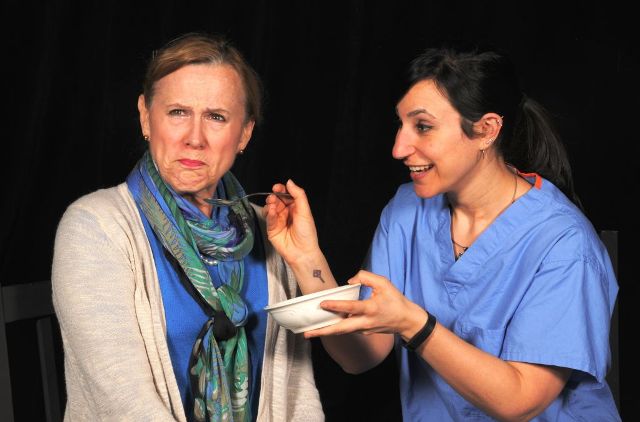We are each of us angels with only one wing, and we can only fly by embracing one another.
—Luciano De Crescenzo
Imagine an expressive, intelligent, woman, who spent most of her adult life bravely breaking boundaries, clearly communicating with exuberance and aplomb her extraordinary determination to arms-against-the wind seemingly touch the clouds atop a trembling plane wing. Now, imagine that same outgoing, daring woman’s voice and abilities tragically silenced as a result of a sudden stroke, and the horror that she feels entombed in her own body, no longer an imagining explorer.
WINGS, by American playwright Arthur Kopit, and directed by George Mulford for The Players Club of Swarthmore’s Second Stage, tells the intimate and harrowing journey of Emily Stilson, an aviatrix turned wing walker, who after a stroke is unable to communicate with the outside world. Likewise, it sheds a perspective on the power of language when the norm is skewed, and the frustrating, miraculous struggle through brain trauma.
The radio drama, WINGS, commissioned for Kopit by the National Public Radio series “Earplay”, germinated from the playwright’s need to understand the mind of his father who suffered a debilitating stroke in 1976 which rendered him incapable of speech or expression. This experience became a study of human emotional isolation and an obsession for the wordsmith to understand the dichotomy between those “looking in” versus the patient “looking out”. Later adapted as a play, WINGS opened at the Lyceum Theatre on January 28, 1979 and ran for 113 performances. It earned Kopit, the two-time Pulitzer Prize finalist, his second of three Tony Award nominations (1979) for Best Play, and a Drama Desk Award nomination (1979) for the staged production.
The ingénue, Emily Stilson, was created by Kopit as an amalgam of two patients he met while visiting his father during speech therapy sessions at that rehab facility – one, a woman who suffered jargonaphasia, the inability to make sense of words; the other stroke victim, a barnstormer turned actress who still with courage and humor struggled with aphasia.
Trina Tjersland, who played Emily Stilson, was mesmerizing, natural. She never leaves the stage, so it is impressive that this role is her first at PCS following a 20-year absence and recent retirement as head of the Drama Department of Tower Hill School in Wilmington, DE. Tjersland led the ensemble as the lead pilot gliding effortlessly across a field, then landing safely beyond. Not so for her character who ironically spins out of control. The playwright’s heroine proclaims at the top of the show, “I am still intact,” and by the end of that act she realizes that the stroke has changed her, not the external world and, “I can’t make it do it like it used to.”
A ‘tilt of the wing’ to director Mulford. His flight plan plunged the cast through the breathtaking highs and lows of the Kolpit script. Kristine Stott (Amy), in her PCS debut, deftly emoted calm amidst a normally frantic environment. The park-under-snow scene between her and Tjersland is particularly touching and honest as the show nears its end. Rick Gross (Billy) and Jack Murphy (Mr. Brownstein) bring to light the struggles of patients suffering extreme aphasia, with some of the few needed moments of levity in the show. Love the comedic bits by Murphy, who performs them all from a wheelchair. Other roles include Doris Chan (Mrs. Timmins), Kevin Doerr, Sally Donovan, Ellie Knickman, and Suzanne Krausen (Ensemble), whose doctors’ visits were as uncomfortable as an annual exam.
Sound clips (Bill Whipple with Keara Piekanski) found in a radio broadcast, are dramatically integrated into the stage production and become an added player, perhaps one of its stars. Jarring at times the clips, and lighting (Alan Stamford), provide context in ways unseen with the radio play. The use of darkness is crucial in guiding the audience like an MRI through the mind’s eye of Emily, her cognitive blips and loss of control, her inability to distinguish exterior stimuli from her own imaginings. Sound effects live and recorded were cleverly interjected to imbue emotional reactions for both the characters and the audience.
The adept production staff includes Linda Fischer, assistant director; Leslie Miller, producer; Chris Stone, stage manager; Laura Kuserk, properties; Adam Young, audition coordinator; and Bridget Dougherty, producing director of The Players Club of Swarthmore Second Stage.
Arthur Kopit believed that airwaves lacked the ability to convey space and time, something inherently important to telling this story. “What we are hearing and what Emily is hearing is not the same,” said Kopit following a performance at the Westfield Insurance Studio Theatre, Idea Center at Playhouse Square on September 26, 2011. “There are conflicts and contrast between the inner world and the outer world.” After talking with a doctor at White Plains Hospital where Kopit did a lot of his research, he ascertained that a stage play would offer visual angles not feasible when listening to radio.
WINGS
by Arthur Kolpit
Directed by George Mulford
January 23 – February 7, 2015
The Players Club of Swarthmore Second Stage
614 Fairview Road
Swarthmore, PA 19081
(610) 328-4271
http://www.pcstheater.org/site/second-stage/race/


